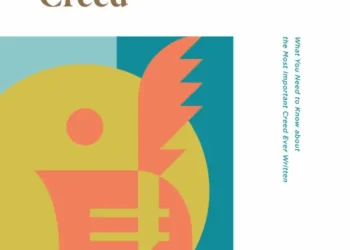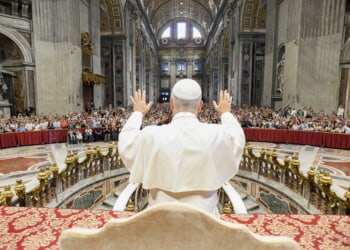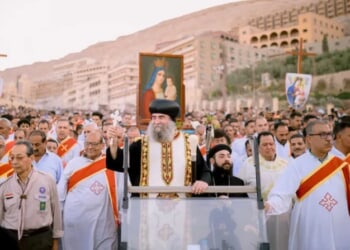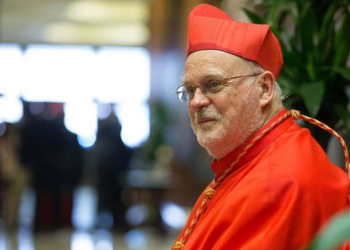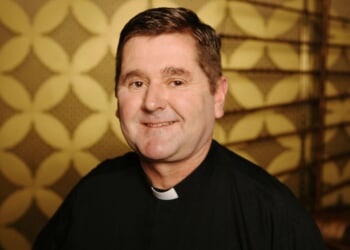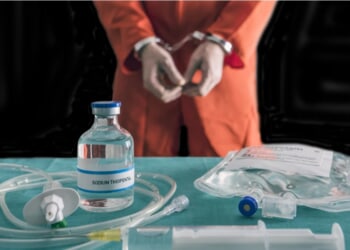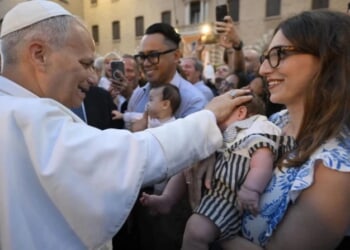Vatican City, Sep 18, 2025 /
08:30 am
Pope Leo XIV said his primary role as leader of the Church is confirming Catholics in their faith and sharing the Gospel with the world, not resolving global crises.
Speaking to Crux senior correspondent Elise Ann Allen in the first sit-down interview of his pontificate, Leo also said he was “trying not to continue to polarize or promote polarization in the Church.”
Leo’s first formal interview as pope took place as part of the biography “Leo XIV: Citizen of the World, Missionary of the 21st Century,” by Allen, out now in Spanish and next year in English.
“I don’t see my primary role as trying to be the solver of the world’s problems. I don’t see my role as that at all, really, although I think that the Church has a voice, a message that needs to continue to be preached, to be spoken and spoken loudly,” he said.
Hot-button issues
In the extensive interview, the first U.S.-born pontiff explained how he plans to tackle divisive issues in the Church, including his approach to LGBT debates, the possibility of women deacons, synodality, and the Traditional Latin Mass.
Leo said he is aware that the Church’s teaching on sexual morality is a highly polarizing topic, and though he welcomes everyone in the Church, he does not intend to make changes — at least not anytime soon.
Signaling his intention to be in continuity with Francis’ open approach, he said “everyone’s invited in, but I don’t invite a person in because they are or are not of any specific identity.”
“People want the Church doctrine to change, want attitudes to change. I think we have to change attitudes before we even think about changing what the Church says about any given question,” he said.
“I find it highly unlikely, certainly in the near future, that the Church’s doctrine in terms of what the Church teaches about sexuality, what the Church teaches about marriage, [will change],” he said.
“The individuals will be accepted and received,” the pontiff added, reiterating the importance of respecting and accepting people who make different choices in their lives.
“I’ve already spoken about marriage, as did Pope Francis when he was pope, about a family being a man and a woman in solemn commitment, blessed in the sacrament of marriage,” he continued.
The “role of the family in society, which has at times suffered in recent decades, once again has to be recognized, strengthened,” Leo said.
He also criticized the publication of rituals blessing “people who love one another” in countries in Northern Europe, saying they violate Pope Francis’ directives in Fiducia Supplicans, which gave permission for nonliturgical blessings of same-sex couples.
“I think that the Church’s teaching will continue as it is, and that’s what I have to say about that for right now,” he said.
Another change the pope said he will not be making at the moment is allowing the ordination of women deacons.
(Story continues below)
Subscribe to our daily newsletter
“I hope to continue in the footsteps of Francis, including in appointing women to some leadership roles at different levels in the Church’s life,” he explained. “I think there are some previous questions that have to be asked. … Why would we talk about ordaining women to the diaconate if the diaconate itself is not yet properly understood and properly developed and promoted within the Church?”
He noted that there is a study group, in the context of the Synod on Synodality, specifically to examine the question of ministries in the Church, including a potential women’s diaconate.
“Perhaps there are a lot of things that have to be looked at and developed at this time before we can ever really come around to asking the other questions. … We’ll walk with that and see what comes,” he said.
Leo described synodality, Francis’ program for wider consultation on Church governance and teaching beyond the hierarchy, as “an attitude, an openness, a willingness to understand” and a process “of dialogue and respect for one another” that could take different forms.
“I think there’s great hope if we can continue to build on the experience of the past couple years and find ways of being Church together,” he noted. “Not to try and transform the Church into some kind of democratic government, which if we look at many countries around the world today, democracy is not necessarily a perfect solution to everything.”
He expressed throughout the interview his willingness to sit down with, and hear out, anyone’s point of view, including proponents of the Traditional Latin Mass — though he has not made up his mind about how to resolve tensions over its celebration.
“It’s become the kind of issue that’s so polarized that people aren’t willing to listen to one another, oftentimes. … That’s a problem in itself. It means we’re into ideology now, we’re no longer into the experience of Church communion. That’s one of the issues on the agenda,” he said.
“Between the Tridentine Mass and the Vatican II Mass, the Mass of Paul VI, I’m not sure where that’s going to go. It’s obviously very complicated,” he added. “It’s become a political tool, and that’s very unfortunate.”
He noted there would be an opportunity soon to speak with people advocating what he called the Tridentine rite of the Mass, a possible reference to an annual pilgrimage of Latin Mass devotees to take place in Rome at the end of October.
The Church’s mission
Leo said another issue on the forefront of his agenda is internal Vatican relations. He lamented that currently, the dicasteries work in a very “isolated manner.”
He praised the renewed focus on evangelization in Pope Francis’ reform of the Roman Curia through the apostolic constitution Praedicate Evangelium, but said there is still more work to be done.
“The lack of dialogue, of instruments of communication, between the different dicasteries has at times been of great limitation and harm to the government of the Church,” he said.
“So, I think that there is an issue there, of, someone used the expression ‘a silo mentality.’ … We have to find a way to bring people together to talk about that.”
One of the issues the Curia has on its plate is the clerical sexual abuse crisis. Pope Leo said while it remains unresolved, it cannot be the Church’s sole focus.
It is a challenge to balance providing help and justice for victims with respect for the rights of the accused, he said. “We’re in kind of a bind there.”
Leo put the issue of clerical sexual abuse into the context of his views on the wider role of the Church in the world: “We can’t make the whole Church focus exclusively on this issue, because that would not be an authentic response to what the world is looking for in terms of the need for the mission of the Church.”
The pontiff said this approach to the Church’s mission would also influence his interaction with Jews, Muslims, and Buddhists. He said it’s important to have respect for those with different beliefs, but “I believe very strongly in Jesus Christ and believe that that’s my priority, because I’m the bishop of Rome and successor of Peter, and the pope needs to help people understand, especially Christians, Catholics, that this is who we are. And I think that’s a beautiful mission.”
During encounters with representatives of other religions, he said, “I’m not afraid to say I believe in Jesus Christ and that he died on the cross and rose from the dead, and that we together are called to share that message.”
He also expressed satisfaction over what he perceives to be an improvement in relations with the Jewish community. Under Francis, the relationship had suffered following the Oct. 7, 2023, attack by Hamas and Israel’s subsequent war on Gaza based on the pope’s strong support of Palestine.
“I may be too presumptuous,” Leo said, “but I daresay that already in the first couple of months, the relationship with the Jewish community as such has improved a bit.”




